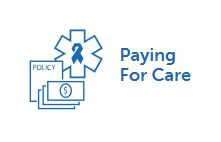Endometrial cancer genetics
Is endometrial cancer a hereditary cancer?
While endometrial cancer is not passed down from mother to daughter, some families do have a higher risk of developing this malignancy – particularly families in which Lynch syndrome is common. Women with Lynch syndrome have a 40 to 60 percent chance of developing endometrial cancer at some point in their lives.
Lynch syndrome is typically caused by a defect in either the MLH1 or MLH2 gene, though defects in the MLH5, MSH6, PMS1, PMS2 and TGBR2 genes are known to cause Lynch syndrome as well. These abnormal genes impair the body’s ability to regulate cell growth and to repair damage to DNA, resulting in a higher risk of developing endometrial cancer.
Source: “Is Endometrial Cancer Genetic?” (Moffitt Cancer Center, Florida)
Women with Cowden syndrome, which is caused by mutations in the PTEN gene, may have about a 20 to 30 percent lifetime risk of developing endometrial cancer.
Source: “Hereditary Ovarian and Uterine (Endometrial) Cancers” (Memorial Sloan Kettering Cancer Center)
Disparities in endometrial cancer genetics?
About 5% to 10% of breast cancer cases are thought to be hereditary, meaning that they result directly from gene changes (mutations) passed on from a parent. The most common cause of hereditary breast cancer is an inherited mutation in the BRCA1 or BRCA2 gene.
Recent news about disparities in genetic mutations
Endometrial cancer genetic testing
Get Genetic Counseling Before Testing
How is genetic testing done?
Susan G. Komen says its “My Family Health Portrait” is an internet-based tool that’s easy to access on the web and simple to fill out and should only take about 15 to 20 minutes to build a basic family health history. It assembles your information and makes a “pedigree” family tree that you can download and share with family members or send to your health care practitioner. It is private–it does not keep your information.
Genetic testing after a endometrial cancer diagnosis
Paying for genetic testing
Insurance coverage for genetic counseling and testing
 Most health plans cover genetic counseling and testing for inherited gene mutations linked to cancer in people who meet the national guidelines. The cost of testing and your out-of-pocket charges may vary based on several factors. People who are denied coverage for genetic testing can file an appeal (FORCE has sample appeal letters). About half of appeals are approved.
Most health plans cover genetic counseling and testing for inherited gene mutations linked to cancer in people who meet the national guidelines. The cost of testing and your out-of-pocket charges may vary based on several factors. People who are denied coverage for genetic testing can file an appeal (FORCE has sample appeal letters). About half of appeals are approved.
Medicare and Medicaid
Genetic counseling and testing is typically covered by Medicare for people already diagnosed with cancer who are in treatment or for whom test results may affect their care. Most state Medicaid programs cover genetic testing for BRCA and Lynch Syndrome mutations for people who meet requirements, which vary by state. You can read more about Medicare and Medicaid coverage of genetic testing here.
Financial assistance or low cost genetic testing
JScreen is a national program based out of Emory University in Atlanta that provides discounted at-home genetic counseling and testing with financial assistance available. Many laboratories offer low-cost genetic testing or financial assistance programs. Programs vary, so if you are not eligible for assistance through one lab, consider contacting other labs to see if you qualify. For more information, see “Paying for Care” on the FORCE website.
Disparities in endometrial cancer genetic testing?
Racial Disparities Persist in Genetic Testing
About 5% to 10% of breast cancer cases are thought to be hereditary, meaning that they result directly from gene changes (mutations) passed on from a parent. The most common cause of hereditary breast cancer is an inherited mutation in the BRCA1 or BRCA2 gene.
